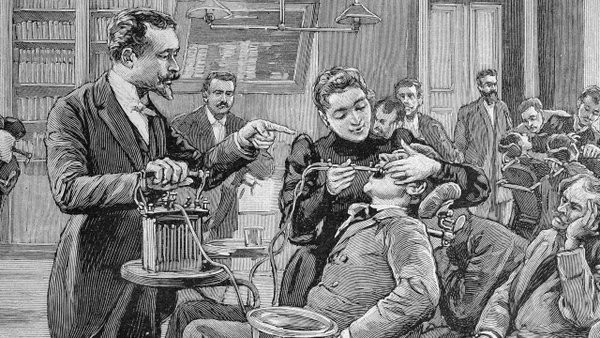The mysterious cases of tooth exploding in history
Many patients with toothache immediately get rid of the pain thanks to the mysterious tooth exploding itself.
In the 19th century, dentist WH Atkinson in the US published in The Dental Cosmos in many cases of patients with self-exploding teeth. He had met three such patients.
The first patient was a missionary from Springfield, USA in 1817. The pain started from the right fangs or the front teeth. Gradually, the pain increased to the point that he could not stand it. He used all kinds of ways to relieve pain but was not effective.
Before having dental services, the toothache used to torture people. According to a study by the University of Sussex, England, in 1862, a man who cried hard for five months because of a toothache. The clergyman was lucky not to suffer such long pain. At 9 am the next day, his teeth exploded and then he no longer felt pain.

Metal used to fill teeth can increase the amount of hydrogen gas in the teeth, causing teeth to explode.(Photo: Alamy).
13 years later, Ms. Letitia D, who lived only a few kilometers away, experienced the same situation. She had a toothache for a long time and the pain only ended when the tooth exploded. The last case took place in 1855. Ms. Anna PA said her left canine exploded from front to back.
Tooth exploding is a strange case but not rare. According to the British Journal of Dentistry, dental explosions with many similar details have happened.
In 1871, American dentist J Phelps Hibler treated a young female patient who had exploded her molars when brushing her teeth. The tooth exploded left such a strong shock that the girl was deaf for the next few days. After that, 5-6 other cases were recorded in the 19th century. But since the 1920s, no tooth rupture occurred.
Hugh Devlin, professor of Dental Restoration at Manchester University of Dentistry, UK, said that although oral diseases were very popular, he had never heard of teeth exploding. He suggested that the case of exploding Antarctic explorers in the 1960s was due to cavities by high sugar diet.
In an article in 1860, Atkinson gave two directions to explain this strange phenomenon. According to the first hypothesis , calories are formed in the teeth, increasing pressure on the pulp. This hypothesis is rejected immediately because it is based on an outdated scientific theory that calories are waterproofing agents that can increase pressure. However, science has proved that this substance does not exist.

Many theories have been made about the phenomenon of teeth exploding in the patient's mouth.(Photo: Alamy).
The second hypothesis is that cavities increase the amount of gas that builds up in the teeth, causing teeth to explode . "We do not know if enough gas accumulates in the teeth that the teeth explode because the teeth have a very solid structure. Nineteenth-century dentists do not understand tooth decay. They think that tooth decay comes from inside but actually that's because of the diet and the amount of bacteria accumulating on the surface of the teeth , " said Professor Devlin.
Perhaps, the most suitable answer comes from human chemicals used to weld teeth. Before mercury was used in 1830, other substances such as lead, tin, silver and alloys were used to weld teeth. Andrea Sella, professor of inorganic chemistry at the University of London, UK, points out that if two different metals are used to weld teeth, they will create a type of electrochemical battery. The whole mouth will turn into a low-voltage battery pack because the metal mixes in the mouth can generate electricity on their own. This increases the possibility of hydrogen gas accumulation in the teeth.
A weak tooth can explode under this pressure. Even hydrogen gas can explode if burned while the patient smokes or metal in the mouth emits sparks. However, patients with teeth that have exploded are never welding, so this hypothesis is not accurate. Currently, the cause of tooth explosions is still a mystery.
- 'The boy's body in the box': Mysterious cases over 60 years failed to find the culprit
- Can not explain the most bizarre cases of human history
- One of the most mysterious cases in British history will be decoded, if ...
- Meteors exploded near the US air base
- Mysterious people without brains
- How do cavities form?
- Experiments show how exploding balloons and unexpected applications
- 3 most mysterious archaeological discoveries in human history
- Tooth 'sensitive' - easily encountered disease, cure tiredness
- Milk tooth decay in young children
- Tooth brushes have a camera
- Japan creates permanent anti-decay patch
 Green tea cleans teeth better than mouthwash?
Green tea cleans teeth better than mouthwash? Death kiss: This is why you should not let anyone kiss your baby's lips
Death kiss: This is why you should not let anyone kiss your baby's lips What is salmonellosis?
What is salmonellosis? Caution should be exercised when using aloe vera through eating and drinking
Caution should be exercised when using aloe vera through eating and drinking